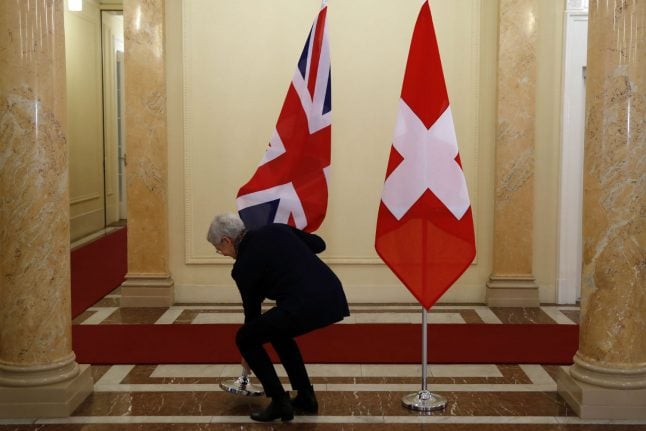While the full list of questions and answers is provided here, The Local have outlined some of the most pertinent with the greatest degree of relevance to our readers.
Read: Embassy responds to queries from Brits in France
The questions cover topics as diverse as pet passports, pensions and purchasing property.
As reiterated frequently by the embassy’s representatives, the following information is to be used as a guide only and does not constitute legal advice.
Will reciprocal health care for UK retirees in Switzerland – exclusively on UK pensions only- via Form S1, continue as previously?
Reciprocal healthcare arrangements are protected under the UK-Swiss citizens’ rights agreement reached in December 2018. This means nothing will change for you and your S1 form will continue to be accepted as before.
Our dog has a EU passport – should we change it for a Swiss one to go back and forth to UK?
Your dog’s EU pet passport will remain valid for travel into the UK. However, UK-issued pet passports would no longer be valid for entry into Switzerland and alternative documentation (i.e. an EU health certificate, which can be acquired from your local OV) would need to be used. Alternatively, if you have a pet passport issued by Switzerland, you can use it to bring your pet to the UK and back into Switzerland.
Correct me if I’m wrong but currently if somebody leaves Switzerland to live in another EU country they must take half of their pension as a lump sum and the other half stays in a trust fund. However if you leave to a none EU country one is entitled to take the entire pension out as a lump sum.
Our understanding of the Swiss pension regulations is that when moving to a country outside of the EU/EFTA, which the UK will become after Brexit, all funds in the company pension scheme (2 pillar) can be withdrawn. This is a decision you need to evaluate carefully. You should seek professional advice to clarify this.
Read: Brits in Europe urged to register to vote ahead of likely Brexit election
Does this mean that those of us living in Switzerland (Vaud in my case) can travel to France after Brexit with no added hindrances or restrictions?
Yes. As with the current rules, we advise that you should carry a valid travel document (i.e. your passport) with you when crossing the border.
We are often asked about travelling across the border as a resident in Switzerland. As you are already in the Schengen area, you are free to continue commuting into Switzerland, travel and shop through the neighbouring country.
As a rule, there are no border checks on individuals at internal borders of the Schengen zone. As with current rules, you should carry a valid travel document (passport) when crossing the border.

The UK's decision to leave the EU has caused stress for Brits in Switzerland. Photo: John MACDOUGALL / AFP
Will existing students from the UK have to pay for health insurance? And will we still be considered EU/Swiss for employment after completing studies?
Existing students from the UK in Switzerland are covered by our Citizens’ Rights Agreement. If you currently benefit from EHIC health cover this will be protected for the duration of your course.
Your permit is also protected by the Citizens’ Rights Agreement. The agreement allows UK nationals to switch status, e.g. between the categories of student, worker, self-employed person, economically inactive person and family member. So your right to switch to a work permit after your course is also protected.
Read: UK issues healthcare warning to British travellers to Switzerland
Purchasing property
We have previously been asked about the impact of Brexit on the ability to purchase property in Switzerland. The ability to acquire permanent residence (a C Permit) is part of Swiss domestic law and hence regulations surrounding what C permit holders can/cannot do lies within Swiss legislation.
In Switzerland, the legislation with respect to which foreigners can buy property is primarily the Lex Koller legislation; at present, there are broadly no restrictions on C permit holders purchasing a primary or a secondary residence in Switzerland, but you should check with your local cantonal authorities to confirm any local requirements.
General question on Biometric permits: I currently hold a First-generation residence permits for foreign nationals (no Biometric data stored), do I need to change it now for a Biometric permit?
p.p1 {margin: 0.0px 0.0px 0.0px 0.0px; font: 12.0px Helvetica}
p.p2 {margin: 0.0px 0.0px 0.0px 0.0px; font: 12.0px Helvetica; min-height: 14.0px}
p.p3 {margin: 0.0px 0.0px 0.0px 0.0px; line-height: 14.0px; font: 12.0px Times; color: #0000e9; -webkit-text-stroke: #0000e9}
span.s1 {text-decoration: underline ; font-kerning: none}
The advice of the Swiss government is that your existing permit remains valid and you do not need to take any action at this stage. You should apply for the renewal of your paper permit when it expires, as usual. At that point you will be issued a biometric permit in credit card form
p.p1 {margin: 0.0px 0.0px 0.0px 0.0px; font: 12.0px Helvetica}
p.p2 {margin: 0.0px 0.0px 0.0px 0.0px; font: 12.0px Helvetica; min-height: 14.0px}
p.p3 {margin: 0.0px 0.0px 0.0px 0.0px; line-height: 14.0px; font: 12.0px Times; color: #0000e9; -webkit-text-stroke: #0000e9}
span.s1 {text-decoration: underline ; font-kerning: none}



 Please whitelist us to continue reading.
Please whitelist us to continue reading.
Member comments